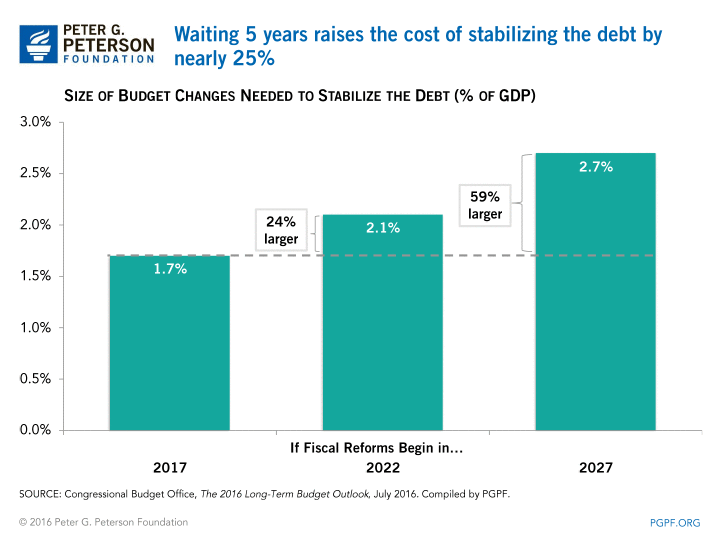You are here
Happy Fiscal New Year 2017!
The new fiscal year for the federal government began on October 1, and policymakers now face a number of important budget decisions. While the last minute passage of a continuing resolution avoided a government shutdown, the relief may be only temporary as this stopgap funding measure runs out on December 9. Therefore, in order to prevent a government shutdown on December 10, Congress and the president must once again come to an agreement.
In addition to resolving annual funding, this fiscal year holds a number of other budgetary challenges and opportunities, including the reinstatement of the debt ceiling, expiring tax provisions, and the budget resolution for Fiscal Year 2018.
In addition to near-term issues, our nation faces serious long-term fiscal imbalances that threaten to undermine economic growth. In 2016, for the first time since 2009, the deficit began rising as a share of GDP. CBO projects that the national debt will climb to 141% of gross domestic product (GDP) within 30 years — more than 3 times its 50-year historical average. That rise in debt would crowd out investments in our future, reduce the flexibility of policymakers, and harm economic growth. Lawmakers should use our annual budget process as an opportunity to set long-run policy priorities for spending and revenues that provide greater certainty about our nation’s fiscal policy.

Fiscal Year 2016 — Looking Back
In November 2015, Congress passed the Bipartisan Budget Act (BBA). This legislation suspended the debt ceiling through March 15, 2017, and also established overall levels for discretionary spending in 2016 and 2017. However, the BBA failed to confront our fundamental long-term fiscal challenges, addressing neither the long-term drivers of spending nor our inadequate tax system.
Congress also passed a budget resolution for only the second time in six years. However, Congress failed to follow through with the passage of regular appropriations bills to fund government agencies and programs before the start of the 2017 fiscal year. As a result, Congress had to pass a continuing resolution (CR) to prevent a government shutdown on October 1.
Fiscal Year 2017 — To-Do list
Lawmakers face a number of urgent tasks over the coming months:
- December 9, 2016 — Continuing Resolution: To prevent a government shutdown, lawmakers will need to enact additional legislation that provides appropriations for discretionary programs on or before this date.
- December 31, 2016 — Expiring Tax Provisions: Congress will face decisions about whether to renew 36 tax provisions that expire on December 31, 2016. These include provisions such as tax credits for renewable energy and special deductions, including tuition expenses, race horses, and NASCAR tracks.
- March 15, 2017 — The Debt Ceiling: The Bipartisan Budget Act of 2015 averted a government default by suspending the debt ceiling through March 15, 2017. Unless lawmakers act to raise or suspend the debt limit before that date, it may lead to a default on Treasury obligations, which could severely damage our economy and our nation’s global standing.
- April 15, 2017 — Budget Resolution: Congress faces a statutory deadline for adopting a budget resolution for fiscal year 2018. Lawmakers should work together to adopt and develop a budget resolution that addresses our long-term fiscal challenges and provides much needed certainty to the budget process.
Conclusion
Governing by crisis, engaging in fiscal brinksmanship, and threatening our nation’s creditworthiness are not effective means of addressing our nation’s fiscal challenges.
By resorting to stopgap measures, lawmakers squander the opportunity to set budget priorities and address long-term fiscal challenges. This creates uncertainty about our fiscal future, and delays the reforms needed to stabilize our debt. CBO estimates the costs of needed fiscal reforms would climb by almost 25% if lawmakers delayed action by only 5 years.

Addressing our long-term fiscal challenges is critical for ensuring that America has adequate resources for investing in our future, and creating robust economic growth and opportunity for future generations. The new fiscal year provides policymakers with opportunities to get our fiscal house in order.
